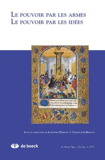
MOYEN AGE
Scope & Guideline
Exploring the Depths of Medieval Thought
Introduction
Aims and Scopes
- Interdisciplinary Medieval Studies:
The journal promotes research that spans multiple disciplines, integrating history, literature, art history, and religious studies, allowing for a more nuanced understanding of the medieval period. - Cultural Encounters and Exchanges:
A significant focus is on the interactions between different cultures during the medieval era, including the impact of trade, migration, and religious exchanges, particularly in the Mediterranean and Eastern Europe. - Historical Narratives and Reinterpretations:
The journal encourages the reevaluation of historical narratives, focusing on how medieval texts and artifacts inform our understanding of societal structures, power dynamics, and cultural identities. - Gender and Identity Studies:
There is a consistent emphasis on exploring themes of gender, identity, and social roles within medieval societies, examining how these elements shaped literature and historical events. - Religious and Philosophical Discourse:
The journal delves into the complex interplay between religion, philosophy, and politics in the medieval world, analyzing how these elements influenced societal norms and cultural production.
Trending and Emerging
- Environmental and Ecological Perspectives:
There is a growing interest in the environmental and ecological aspects of the medieval world, exploring how societies interacted with their natural surroundings and the implications for contemporary environmental studies. - Digital Humanities and Manuscript Studies:
The integration of digital humanities methodologies is on the rise, with increased focus on manuscript studies, textual analysis, and the digital representation of medieval texts and artifacts. - Transnational and Global Histories:
Scholars are increasingly examining medieval history through transnational and global lenses, highlighting connections and exchanges across different regions and cultures. - Postcolonial Perspectives:
Emerging scholarship is applying postcolonial frameworks to medieval studies, analyzing the complexities of identity, power, and cultural representation in a historical context. - Interdisciplinary Approaches to Gender Studies:
There is a notable increase in interdisciplinary research addressing gender issues, exploring how gender roles and identities were constructed and represented in medieval literature and society.
Declining or Waning
- Traditional Military History:
There has been a noticeable decrease in publications focusing solely on traditional military history, indicating a shift towards more comprehensive analyses that incorporate social, cultural, and economic perspectives. - Hagiography and Saints' Lives:
Research centered on hagiography and the lives of saints appears to be waning, possibly due to the increasing interest in secular narratives and broader cultural contexts. - Chronicles and Annals:
The focus on medieval chronicles and annals as standalone subjects has diminished, reflecting a broader trend towards analyzing these texts within interdisciplinary frameworks. - Feudalism as a Central Theme:
The exploration of feudalism as a primary framework for understanding medieval society is less prevalent, with scholars increasingly favoring discussions that integrate social, economic, and cultural dimensions. - Art Historical Studies in Isolation:
Art historical studies that do not connect to broader cultural or societal themes are becoming less common, suggesting a trend towards integrating art with other aspects of medieval life.
Similar Journals
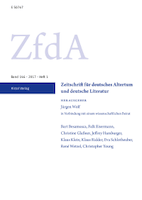
ZEITSCHRIFT FUR DEUTSCHES ALTERTUM UND DEUTSCHE LITERATUR
Unveiling the Rich Tapestry of German AntiquityZeitschrift für deutsches Altertum und deutsche Literatur is a pivotal academic journal dedicated to the exploration and analysis of German-language antiquity and literature. Published by S Hirzel Verlag, this esteemed journal is based in Germany and has been contributing to the fields of Linguistics, Language, and Literary Theory since its inception. With a history spanning from 1979 to the present, the journal showcases rigorous research and critical studies that enhance our understanding of both historical and contemporary literary landscapes. Although currently not an open-access publication, Zeitschrift für deutsches Altertum und deutsche Literatur operates within the Q4 quartile in its respective categories, reflecting a unique niche within the academic community. As a valuable resource for researchers, professionals, and students alike, it fosters a deeper appreciation for the intricacies of German literature and its evolution, serving as an essential platform for scholarly discourse.
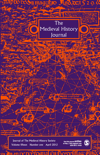
MEDIEVAL HISTORY JOURNAL
Connecting Cultures Through Medieval ScholarshipWelcome to the MEDIEVAL HISTORY JOURNAL, a prominent academic platform published by SAGE PUBLICATIONS INC, dedicated to advancing the field of medieval studies. Since its inception in 1998, this journal has established itself as a vital source of scholarly discourse, offering a rich array of articles that cover various aspects of medieval history, from cultural and societal developments to the intricate interplay of politics and religion. With an impressive rank of #568 out of 1760 in the Scopus Arts and Humanities History category and a respectable 67th percentile, the journal exemplifies rigorous academic standards and impactful research. Although it operates primarily under subscription access, its contributions are indispensable for researchers, professionals, and students seeking to deepen their understanding of the medieval era. The journal's ongoing commitment to publishing cutting-edge research makes it a cornerstone for anyone passionate about exploring the complexities of medieval history.

Miscelanea de Estudios Arabes y Hebraicos-Seccion Hebreo
Celebrating Diversity in Linguistic and Cultural ScholarshipMiscelanea de Estudios Arabes y Hebraicos-Seccion Hebreo is a distinguished interdisciplinary journal published by Universidad de Granada, Editorial, focusing on the intricate fields of Arabic and Hebrew studies. Established in 1955, this open-access journal promotes scholarly discourse and research, allowing free access to its articles, which enhances the dissemination of knowledge. With an ISSN of 1696-585X and an E-ISSN of 2340-2547, the journal has garnered attention in various academic categories, reflecting its relevance and impact: achieving Q2 rankings in both Literature and Literary Theory and Religious Studies, as well as a Q3 ranking in Cultural Studies and History as of 2023. Operating from its base in Granada, Spain, Miscelanea de Estudios Arabes y Hebraicos-Seccion Hebreo contributes significantly to the advancement of cultural understanding, and its accessibility since its inception underscores its commitment to fostering academic excellence. Researchers, professionals, and students interested in the rich interplay between linguistic, cultural, and historical contexts will find this journal an invaluable resource for their studies.
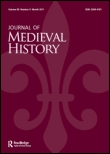
JOURNAL OF MEDIEVAL HISTORY
Bridging Eras with Insightful Medieval ResearchJOURNAL OF MEDIEVAL HISTORY, published by Routledge Journals, Taylor & Francis Ltd, stands as a vital resource in the field of historical studies, focusing on the complex tapestry of the medieval period from 1975 to 2024. With an ISSN of 0304-4181 and E-ISSN of 1873-1279, this journal boasts an impressive Q2 categorization in History, ranking #502 out of 1760 in the Scopus Arts and Humanities rankings, placing it in the top 29% of its field. The journal aims to publish high-quality, innovative research that enhances the understanding of medieval history, making it an indispensable read for scholars, practitioners, and students alike. While it does not currently offer Open Access options, its reputable standing ensures that it reaches a wide audience dedicated to exploring the intricacies of the medieval era. Engage with cutting-edge scholarship and historical insights that collectively contribute to the advancement of medieval studies.
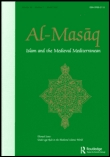
Al-Masaq-Journal of the Medieval Mediterranean
Advancing Scholarly Dialogue on Historical InsightsAl-Masaq: Journal of the Medieval Mediterranean is a premier academic journal published by Routledge Journals, Taylor & Francis Ltd, focusing on the intricate tapestry of medieval Mediterranean studies. With its first publication dating back to 1988, this journal invites researchers and scholars to explore the rich history, culture, and religious dynamics that shaped the Mediterranean region during the medieval period. The journal is strategically indexed and ranks in the Q3 quartile for both History and Religious Studies, positioning it within the top 25% of similar publications. Al-Masaq aims to bridge the gaps between various disciplines related to medieval studies, promoting interdisciplinary discourse and scholarly collaboration. Though it operates under a subscription model, the journal remains accessible to the academic community, fostering a robust dialogue on vital historical insights and research developments. Its esteemed contributors and comprehensive peer-review process underscore Al-Masaq’s importance as a significant platform for both emerging and established voices in the field.

Acta Baltico-Slavica
Fostering Inclusivity in Historical and Linguistic NarrativesActa Baltico-Slavica, an esteemed academic journal published by the Polish Academy of Sciences, Institute of Slavic Studies, serves as a vital platform for the exploration of Slavic cultures, languages, and historical narratives. Since its transition to Open Access in 2014, the journal has fostered inclusivity and accessibility, allowing researchers, professionals, and students to engage with cutting-edge scholarship in the fields of History, Linguistics and Language, and Literature and Literary Theory. With a commendable impact as indicated by its category quartile rankings (Q2 in History and Literature, Q3 in Linguistics), and Scopus rankings reflecting its significance within the academic community, Acta Baltico-Slavica not only contributes to the rich tapestry of scholarship surrounding the Baltic and Slavic regions but also encourages interdisciplinary dialogue. The journal’s commitment to advancing knowledge across its fields of study makes it a prominent destination for scholarly discourse and research inquiry.

Studia Historica-Historia Medieval
Advancing Knowledge in Medieval StudiesStudia Historica-Historia Medieval, published by EDICIONES UNIV SALAMANCA, is a premier open-access journal dedicated to the field of medieval history. Since its inception in 1983, this Spanish journal has provided a platform for scholars to disseminate innovative research, analyze historical trends, and foster academic discourse within the broader historical context. With an impressive ranking of Q1 in History and a notable position within the Scopus Arts and Humanities ranking (Ranked #473 out of 1760, 73rd percentile), Studia Historica stands out as a vital resource for researchers, professionals, and students alike. The journal embraces a wide spectrum of topics related to medieval studies and offers open access to its articles, facilitating the global exchange of knowledge and ideas. With a commitment to rigorous peer review, it aims to uphold high academic standards and contribute significantly to the historiography of the medieval period.

Reti Medievali Rivista
Exploring the Depths of Medieval HistoryReti Medievali Rivista, published by FIRENZE UNIV PRESS, stands as a distinguished platform in the field of history, specifically focusing on the medieval period. With an ISSN of 1593-2214, this journal has embraced Open Access since 2000, ensuring that its scholarly content is readily available to researchers, students, and professionals worldwide. Based in Italy, the journal boasts a Q2 ranking in the Category of History according to the 2023 quartiles, reflecting its significant impact and contribution to the discipline. With a Scopus rank of #809 out of 1760 in the Arts and Humanities category, it sits comfortably within the 53rd percentile, affirming its quality and relevance in the academic community. The journal's scope encompasses a wide range of topics related to medieval studies, making it an invaluable resource for those seeking in-depth research and analysis in this pivotal era of history. Scholars are encouraged to explore its diverse articles and insights, further enriching the dialogue surrounding medieval scholarship.
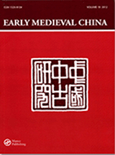
Early Medieval China
Bridging Disciplines to Reveal Early Medieval ChinaEarly Medieval China is a distinguished journal published by ROUTLEDGE JOURNALS, TAYLOR & FRANCIS LTD, specializing in the intricate study of early medieval China through an interdisciplinary lens that encompasses Anthropology, Cultural Studies, History, Literature and Literary Theory, Philosophy, and Religious Studies. With a commendable impact factor and a prestigious standing in various quartile rankings, such as Q1 in Literature and Literary Theory and Q2 in Cultural Studies and History for 2023, this journal serves as a vital resource for scholars, researchers, and students alike. It aims to promote a deeper understanding of China's early medieval period by publishing innovative research, critical essays, and comprehensive analyses that contribute to the broader discourse on Asian studies and history. By offering a platform for cutting-edge research, Early Medieval China plays an essential role in enriching academic dialogue and fostering further explorations in this historically significant field.
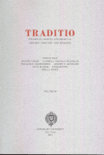
TRADITIO-STUDIES IN ANCIENT AND MEDIEVAL HISTORY THOUGHT AND RELIGION
Charting the Course of Thought Through TimeTRADITIO - Studies in Ancient and Medieval History, Thought and Religion is a distinguished academic journal published by Cambridge University Press, dedicated to the exploration and analysis of historical, philosophical, and religious narratives from ancient and medieval periods. The journal's ISSN is 0362-1529 and its E-ISSN is 2166-5508. Renowned for its rigorous scholarship, it enjoys a notable standing in the academic community, reflected in its 2023 category quartiles which place it in the second and third tiers across critical fields such as Literature and Literary Theory, Philosophy, Religious Studies, and Visual Arts and Performing Arts. With its comprehensive scope that encompasses multidisciplinary approaches, TRADITIO provides an essential platform for researchers, academics, and students alike to engage deeply with the complexities of historical thought and cultural practices. Although the journal operates within the traditional subscription model, its significance is underscored by impressive Scopus rankings, indicating its high visibility and impact within the arts and humanities sectors. We invite you to discover the richness of ancient and medieval studies through the pages of TRADITIO.